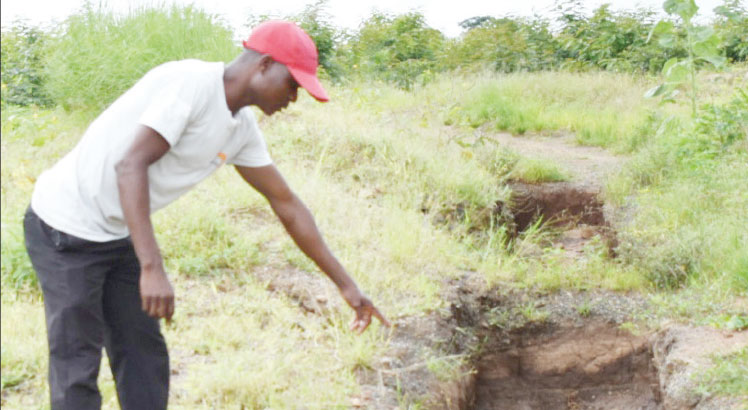For years hunger used to torment Felix Chizombe’s family in Namarwa Village in Phalombe District.
Since 2009, the rural farmer, 46, toiled in vain, seldom harvesting enough food to take his family to the next harvest.
His 1.5 hectare field could only produce five to six bags of maize that only lasted for two months.
“Despite applying costly chemical fertilisers and doing back-breaking tasks, hunger always kicked in by June every year,” recalls the father of five.
The crop yield kept dwindling due to outdated farming methods coupled with erratic rains, flooding, hailstorms, chronic dry spells and loss of fertile soils to run-off water.
Likaka inspects a water-harvesting trench
The Food and Agriculture Organisation (FAO) of the United Nations (UN) reports that environmental degradation has worsened the vulnerability of subsistent farmers, who heavily depend on rain-fed agriculture, to the climate-related shocks.
Like other crop fields at the foot of deforested Mpasa Hills, Chizombe’s plot was not spared the effects of climate change. The breadwinner struggled to provide for his family of eight.
“I was forced to go to Mozambique for piecework. I could be there for three to four months just to get some money for food. This was not sustainable and the conditions were harsh,” he says.
However, his crop yields began to improve in 2019. When he harvested enough to beat hunger despite the devastation caused by Cyclone Idai in southern Africa.
His maize yield more than doubled to 13 bags in 2019 harvesting season, 21 in 2021 and 25 last year.
A relaxed Chizombe credits his food security to integrated watershed management activities spearheaded by World Vision Malawi in partnership with the World Food Programme (WFP) to build rural communities resilience to climate change.
The British Government-funded intervention in which the locals establish water harvesting structures such as checkdams, eyebrow basins, deep trenches and swales on the slopes of Mpasa Hills and in their fields to harvest rainwater. They also created stone bunds on the steep slopes, planted trees and kept hands off tree stumps to ensure they sprout again.
Ending climate migration
Chizombe no longer goes to Mozambique as he produces more than enough to feed his family.
Similarly, Frank Likaka, says the landscape restoration activities are helping farmers get bumper harvests amid climate change. His harvest from a maize field the size of a football ground has risen from five to 29 bags a year.
“The run-offs and flash floods have become history as the structures slow down water to sink into the ground and lessen the loss of top soil,” he says.
Apart from climate-smart agriculture methods, the 36 year-old farmer says manure use has reduced the cost of crop production and risks of drought and dry spells scorching his crop.
He explains: “Making manure is a timely solution to deal with exorbitant prices and scarcity of chemical fertilisers.
“We make Bokash and Mbeya manure using locally available materials such as crop residues and animal droppings. This is effective in restoring fertility and hold moisture long enough for crops to thrive.”
Bokash is made by mixing one buckets of ash, three 15-litre buckets of dung, dead plants and 10 litres of water.
The farmers mix 20 kilogrammes (kg) of animal dung, 10 kg of fertiliser, 10kg of ash with 20 kg of maize bran to make Mbeya.
Community awareness
With food security improving, Chizombe says most farmers are eager to participate in community activities to conserve soil and water while boosting their crop yields.
“These are our assets, so we have to maintain them. I have more surplus to sell and get money for developing my households. There cannot be sustainable development with a neglected environment,” he says.
WFP programme policy officer Elton Mgalamadzi is pleased the interventions have strengthened communities’ resilience, conserved the environment and improved livelihoods.
“The most exciting news is the sustainability of the locqal initiatives. The communities own and lead the interventions as they know importance of conserving the environment,” he says.
According to FAO, a Malawian farmer loses an average of up to 30 tonnes of fertile soil per hactare every year. This is mostly fuelled by soil erosion and deforestation, breaching farmlands and silting rivers.
The post Conserving soil for food security first appeared on The Nation Online.
 Moni Malawi
Moni Malawi 

